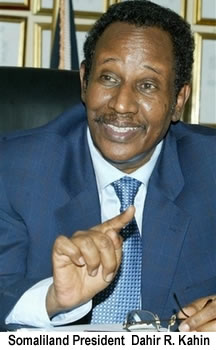Monday, October 02, 2006
 HARGEISA, Somalia (AP) - The president of the breakaway republic of Somaliland played down the rise of Islamic militants in the region but said if they tried to destabilise his territory they would be treated as an enemy.
HARGEISA, Somalia (AP) - The president of the breakaway republic of Somaliland played down the rise of Islamic militants in the region but said if they tried to destabilise his territory they would be treated as an enemy.
Speaking to The Associated Press at his office in the capital Hargeisa yesterday, President Dahir Rayale Kahin said that Muslim Sharia law has long been used in Somalia, but had now taken on a disturbing "fanatical slant.''
Somaliland, an unrecognised self-declared republic in northern Somalia, has already experienced Islamic extremism.
Since 2003 four foreign aid workers have been killed in attacks blamed on Aden Hashi Ayro, military chief of an Islamic militant group. The UN says he is a suspected Al Qaeda collaborator trained in Al Qaeda camps in Afghanistan.
On Wednesday Mr Ayro surfaced in Kismayu in southern Somalia, a strategic seaport that the Islamic group wrested from forces that support Somalia’s weak internationally recognised government based in Baidoa.
Somaliland declared its independence from Somalia in 1991 and has been relatively peaceful and stable compared with the rest of Somalia, which descended into anarchy following the 1991 overthrow of longtime dictator Mohamed Siad Barre by warlords.
Northern area
President Kahin’s territory is in the northern area that was British Somaliland until 1960. The British withdrew at that time as Italian Somaliland, to the south, gained independence and the two became the new nation of Somalia.
Mr Kahin said Somaliland was not going to seek to rejoin Somalia because for 30 years they were a union, "and it ended in disaster. We have no intention of going back to that no more.''
However, Mr Kahin said Somaliland is willing to discuss common issues with Somalia when a government there takes hold.
"We will talk about how they (Somalia) must reach the state where we are now. We can talk as two equal states,'' he said.
The president, however, believes that the situation is fluid in Somalia and time will tell whether Islamists who have been on the ascendancy since June, seizing much of southern Somalia, will be a power to reckon with.
"Let us see whether they will stay in the areas they (the Islamists) are ruling. I see what is going on is fluid. Let us give them time,'' Mr Kahin said.
Although he said Somaliland is not concerned by the rise of the Islamists in southern Somalia, Mr Kahin said that if they seek to expand their influence northwards into Somaliland, "They will be an enemy like others.''
Islamic militia have swept through southern Somalia since taking over the capital in June. Its strict and often severe interpretation of Islam raises the spectre of Afghanistan’s ousted Taliban militia, and contrasts with the moderate Islam that has dominated Somali culture for centuries. Some Somalis, though, have welcomed the order the militia brought after years of anarchic clan rule.
The United States has accused the Islamic group of sheltering suspects in the 1998 Al Qaeda bombings of US embassies in Kenya and Tanzania. Al Qaeda chief Osama bin Laden has portrayed Somalia as a battleground in his war on the US. Mr Kahin believes the entire region will only have peace when its leaders stop looking for outside help to resolve its 15-year conflict and other countries stop trying to find solutions.
Somalia’s leaders and the people, he said, need to sit down and negotiate their differences as happened when the British withdrew
Since 2002, Somaliland has made efforts to set up democratically elected state structures. The most recent was its first multiparty parliamentary elections in September 2005, which saw Mr Kahin’s Udub party win 33 seats and becoming the single largest party in the 82-member House of Representatives.
Mr Kahin won the 2003 presidential elections. His party won the 2002 single-party local polls. The majority of voters endorsed Somaliland’s secession from the rest of Somalia in a 1999 referendum. The region has its own security and police forces, justice system and currency.
Source: AP, Oct 2, 2006